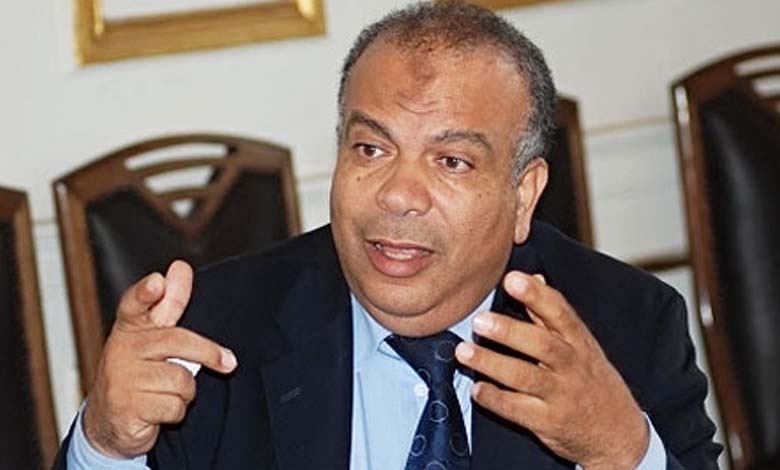El-Katatny Tells His Story with the Muslim Brotherhood… From Joining to Leaving

Writer and journalist Islam El-Katatny shared his story with the Muslim Brotherhood and his unique experience in the program “Revisions” aired on (Al Arabiya) channel, detailing the intellectual transformations he underwent, which led him to break free from the Brotherhood’s constraints after spending many years in its ranks.
El-Katatny stated, “I grew up in a religious family, and it was natural for me to seek out the Muslim Brotherhood. You can imagine that from a young age before high school, I was reading books like ‘Days of My Life’ or ‘The Massacres of the Muslim Brotherhood in Egyptian Prisons.'”
El-Katatny spoke extensively about the idea of victimization promoted by the organization, one of the most influential ideas on him, convincing him that the organization was persecuted and oppressed, which drove him to join them. He added that “this idea of victimization is one of the most encouraging ideas for young people to join the organization.”
-
German Analyst Reveals: Our Country Fights All Terror Centers and Organizations Affiliated with Iran and the Muslim Brotherhood
-
The Mufti of the Muslim Brotherhood attacks the Libyan parliament… and talks about Western plans in collaboration with the Gaddafi regime
High school was a decisive turning point in El-Katatny’s life when he began participating in the organization’s activities and events, seeking an identity and a place to belong, convinced that “the Muslim Brotherhood” carried “the banner of true Islam,” and he officially joined them.
After joining the Muslim Brotherhood in high school, El-Katatny began to progress within the organization, taking on numerous responsibilities such as recruiting young people in high schools and universities, considering this age group the most influential and likely to join the Brotherhood.
-
Is lying a fundamental doctrine in the Muslim Brotherhood?
-
Muslim Brotherhood Leaks… Book Analyzes the Role of Drama in Exposing Brotherhood’s Plots
El-Katatny admitted during the program that his involvement in the organization’s activities blinded him to its flaws, noting that his activities were not limited to recruitment but also included organizing group iftars, sports activities, and preaching, all aimed at strengthening bonds between members and attracting more young people.
Over time, El-Katatny began to see the contradictions and duality between the rhetoric and practices within the Muslim Brotherhood. This was the initial spark that ignited his desire to separate, as he began to notice that political practices did not align with the principles he had been taught. He said, “The political practice was inconsistent with the ethics of a preacher, it was far removed from the ethics of preaching.”
-
The Muslim Brotherhood’s attempt to exploit the kidnapping of a Yemeni Army Commander
-
Analysts reveal the danger of Muslim Brotherhood expansion in European Societies
He continued, “One of the most prominent contradictions was the absence of the concept of a nation within the organization, which prompted him to seriously consider separating.”
El-Katatny discussed the difficulty of leaving the organization, stating that the transition from inside to outside was not easy, as he faced an internal struggle between the belonging he had grown up with and the desire to break free from the organization’s constraints. It took several years of internal conflict before he could make his final decision to leave, a moment he described as “intellectual emancipation.”
He added that after his departure, he faced isolation and defamation from the Brotherhood, asserting that the organization always sought to discredit those who left to ensure they did not influence other members.
According to El-Katatny, “the ideas of Sayyid Qutb, unfortunately, were the cause of the destruction in the region.” His ideas of governance, ignorance (Jahiliya), emotional isolation, and superiority by faith played a major role in shaping the organization’s orientations, leading it astray from the right path.
El-Katatny noted that the organization is currently suffering from major internal divisions, having split into three main factions: the London wing, the Istanbul wing, and the wing within Egypt, although it calls for the unity of Muslims. This division reflects internal tensions and the lack of agreement on a unified vision for the future.
El-Katatny mentioned that Western support, particularly from the United States and Britain, played a significant role in the organization’s rise at certain times, but recent events indicate changes in the structure of this relationship.
He stated that “the current situation of the Muslim Brotherhood and the challenges it faces include the imprisonment of leaders, Western support, and popular support.”
-
The Muslim Brotherhood is experiencing an unprecedented state of financial and organizational corruption – Details
-
The Muslim Brotherhood casts doubt on a Prophetic Hadith… Details
He explained that the organization has lost a significant portion of the Egyptian people’s support due to the behavior of its leaders in recent years, and the Egyptian people no longer trust the Brotherhood as they once did, which poses a major challenge to the organization’s attempts to return to the political arena.
In conclusion, El-Katatny sent an important message to the youth, emphasizing the importance of critical thinking and personal reviews. He stressed the need for young people to be aware and not be swayed by catchy slogans without verifying their credibility.












